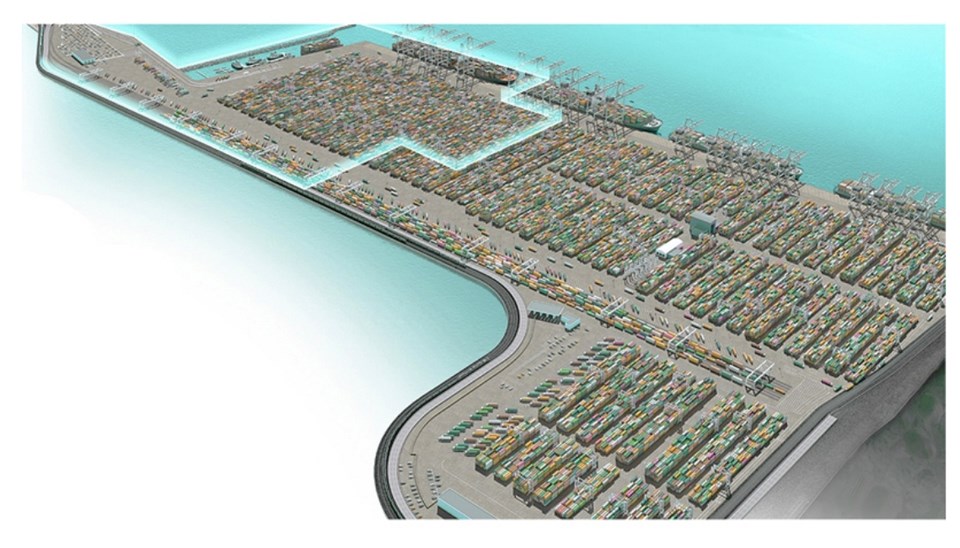Canadian court has issued a decision against terminal operator GCT Canada Ltd. in its accusations that the Vancouver Fraser Port Authority (VFPA) showed a conflict of interest in prioritizing its own expansion project over a rival GCT one.
In a decision issued on July 26, federal justice Peter George Pamel dismissed GCT’s claims that the Port Authority showed “an incurable failure to act as an impartial decision maker under its statutory mandate” when it decided to defer GCT’s application to expand container terminal capacity at Roberts Bank – a project known as Deltaport Berth 4 (DP4).
The Port Authority said its preference for container capacity expansion is instead Terminal 2 (RBT2), a much larger and costlier landfill expansion that is spearheaded by the VFPA itself.
“I am not persuaded by GCT that there is any evidence that the VFPA executives were actually bias against the DP4 project or that what GCT claims to be the indicia of such bias is in any way evidence of a reasonable apprehension of bias on the part of the VFPA executives,” Pamel wrote in his decision.
GCT was asking the court to compel Canada’s federal transport minister or Transport Canada to intervene and assess DP4 in a process not conducted by the VFPA, but Pamel said changes to the environmental assessment process that DP4 would face have rendered - as well as VFPA’s decision to actually proceed with a review of the GCT project (albeit with the stated preference for RBT2) – have rendered the matter moot.
Pamel further noted that his decision is not based on critiquing faults and merits of the existing system of assessing which port projects would proceed first (as outlined under the Canada Marine Act, or CMA), but rather a determination of whether there was actual unfair bias and dereliction of duty as an adjudicator on the part of the VFPA in choosing its own project over DP4.
“I will say that a port authority under the CMA is a non-adjudicative decision maker, and its regulatory role is tethered to its role as manager and operator of the port,” Pamel said.
“It seems to me that the March 2019 decision [to state preference for RBT2] was more of a reflection of the VFPA improperly putting its commercial foot ahead of its regulatory foot. Although this may be a result of the overlapping structure created by Parliament in the manner that the CMA set up the VFPA, it is not, in my view, a manifestation of actual impermissible bias. Commercial people will act in commercial ways; that is not always a reviewable error.”
In a written statement, VFPA board chair Judy Rogers called the decision “a major victory for port authorities across the country.”
“Given their federal mandate to enable Canada’s trade through ports across the country, it is essential that Canada Port Authorities are empowered to make complex and difficult decisions focused on the best interest of Canada’s trading needs and not corporate shareholders,” Rogers said.
In a responding statement, GCT officials said they are disappointed in the decision and is already discussing with their legal counsel about possible next steps.
"GCT believes that the court ought to have taken the further step of ordering the remedies sought by GCT once it found that the Vancouver Fraser Port Authority had failed to treat GCT’s project enquiry fairly or in a manner consistent with the type of conduct expected of regulators who have been granted the sort of statutory authority that VFPA received from the Government of Canada," the statement said.
The company also continued its messaging on social media, stating that DP4 – a smaller and less costly project – is both financially and environmentally a better solution than the multi-billion RBT2 that would involve the creation of a new island in the Fraser River Estuary through landfill.
The RBT2-DP4 saga is one of the most controversial port project issues currently in play. In application for about a decade, RBT2 has run up against vocal opposition from environmental groups (who contend the project would destroy key wildlife habitat), as well as local municipalities like Delta and Richmond (who contend the extra congestion and pollution from the facility would negatively impact the quality of life in those communities).
RBT2 is currently awaiting the Impact Assessment Agency of Canada’s assessment of the latest round of public comments (which ended in March). The project approval process was delayed for more than a year in 2020 after a review panel found significant issues that the VFPA needed to address. Ottawa then gave the VFPA a year’s time to compile new information to address those concerns.
DP4 is also moving along in its proceedings, albeit at an earlier stage. The project has moved forward to the Impact Statement Development Phase, with the IAAC having issued final joint guidelines and notice of commencement on the case.
Meanwhile, GCT and the VFPA maintain a delicate relationship; GCT is the tenant and operator of Deltaport, the VFPA's existing terminal facility at Roberts Bank. VFPA has said it prefers finding another operator for RBT2 to keep rates competitive for vessels seeking to dock at the port.



